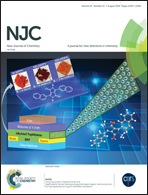Sulfonic acid-functionalized organic knitted porous polyaromatic microspheres as heterogeneous catalysts for biodiesel production†
Abstract
The use of renewable energy sources decreases the consequences of greenhouse gas emission from fossil fuels. Biodiesel, an easily burning and biodegradable fuel, is an alternative to conventional diesel fuel. The esterification of long-chain fatty acids and transesterification of triglycerides are two major reactions widely used to convert vegetable oils or animal fats into biodiesel. As solid acid catalysts are considered promising candidates for biodiesel production, we have synthesized a series of organic knitted porous polyaromatics (OPPs) using pyrene, anthracene, and naphthalene as monomers via Friedel–Crafts alkylation, followed by crosslinking reactions. The resultant polymers showed good surface morphology, stability and swelling property, high capacity for functionalization due to the unreacted bromomethyl groups on the surface, and excellent hydrophobicity. The sulfonated polymer microspheres obtained by the surface sulfonation showed good surface acidity; thus, they can be employed as heterogeneous solid acid catalysts for the esterification of long-chain fatty acids and transesterification of triglycerides, and they are reusable without any leaching of functional groups.



 Please wait while we load your content...
Please wait while we load your content...